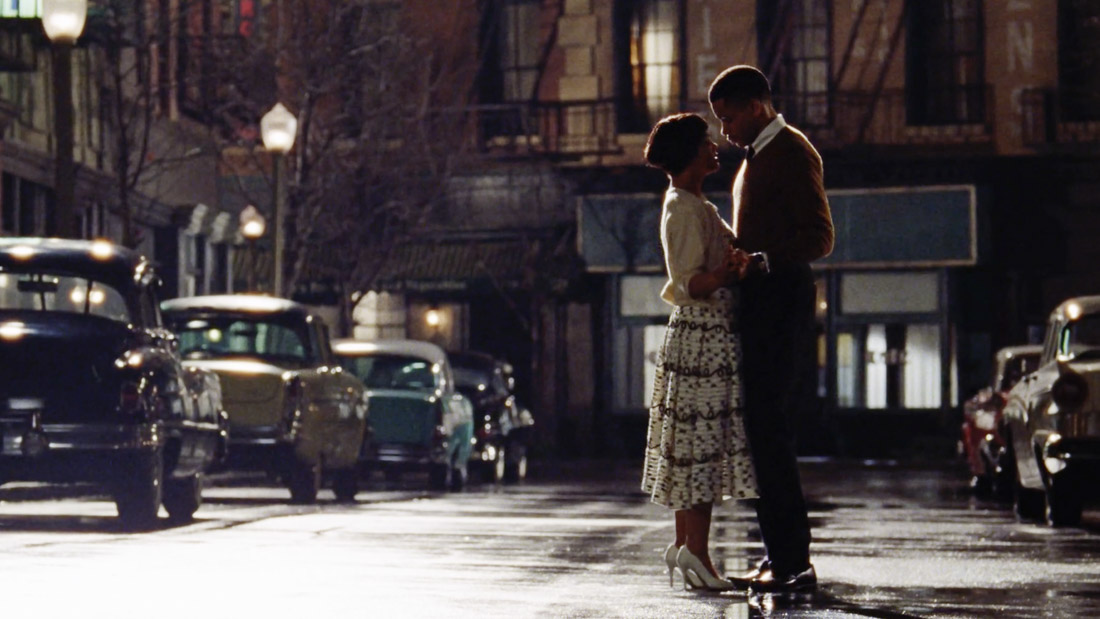
“Ya know, most people don’t find that kind of love, even for a summer. It’s extraordinary.”
Sometimes love isn’t enough. Our feelings for another person may be strong and genuine, but circumstances beyond our control make love affairs short and fleeting. People come into your life for seasons, providing lessons learned and experiences cherished. It is our hope though, that the ties that bind are strong enough to overcome any impediments and lead love back toward us. A tender new love story tells one such tale.
Sylvie’s Love transports us to 1950s New York City where we meet Sylvie (Tessa Thompson), a young woman with dreams of becoming a television producer while spending her days working in father’s record store waiting for her soldier fiancé to return from overseas. While working one day, in walks Robert (Nnamdi Asomugha), or Bobby for short, a saxophonist in a jazz quartet. Bobby takes a part-time job at the record store where a friendship with Sylvie blossoms into a love affair. As the summer winds down, life takes them in different directions, bringing their relationship to an end. Years pass and Sylvie and Robert cross paths again, only to find that while their lives have changed, their feelings for each other remain the same.
The core of Sylvie’s Love is about the sacrifices that we come to make in the service of love, particularly those we make at our own expense. Both Sylvie and Bobby have to sacrifice a part of themselves at a point and time in order to sustain their relationship and support their partner. The tough choices they are forced to make is indicative of the places that love often takes us, where we have to display our love for our significant other by at times stepping back in order to protect them. This aspect of the love story provides a bit of harsh realism that makes for added resonance amongst the audience opposed to the typical fairy tale depiction of what love is.
The film also contains exploration of the social implications of class and how it affects not only our love lives, but everything around us. Sylvie is forced to navigate the expectations placed upon her by family’s social standing and what her mother wishes her to be. These expectations run counter to the person Sylvie wishes to be and the life she wants to lead. This is made clear in the film not just through her struggle to love Robert against her mother’s wishes, but in a pivotal scene where Sylvie and her husband host an executive and his wife in hopes of her husband being hired at his firm. The executive’s wife reveals to Sylvie that the motivation behind her husband’s recruitment is in part to satisfy discrimination claims from the NAACP. Sylvie is repulsed, but her husband brushes off insult as an opportunity too grand to pass up. The struggle of whether to go along to get along is a tug of war black professionals always find themselves faced with some handling it as Sylvie’s husband did and others more closely mirroring Sylvie. Director Eugene Ashe is able to convey this dichotomy well through his writing and direction.
Sylvie’s Love’s cinematography, production design, and costume design all grab you immediately, transporting you into what feels like an entirely real and immersive 1950s and 1960s Harlem setting. Its aesthetic is jazzy and sultry with the glamorous wardrobe and brilliant colors to match and may single-handedly resurrect gloves as a part of ladies’ evening wear. One of the film’s best shot scenes is its opener where we first meet Sylvie and Bobby. The scene is staged to look like a split screen, using the building’s facade to contrast with the theater doors with the two characters opposite each other. The introduction of the Countess dressed in brilliant red amidst the blue hue of the Blue Morocco is both eye-catching and a good bit of visual storytelling warning of the danger she presents.
In terms of the film’s cast, Tessa Thompson is the clear standout with a superb performance, completely transforming herself into a lovestruck debutante torn between her heart and the expectations foisted upon her. Nnamdi Asmougha also does a good job in his his first leading role and shows a bit of leading man potential that peeks through at times. The chemistry between these two actors is what makes the film work and keeps audiences invested. The couple’s impromptu dance in the street that also is a slight homage to the classic slow dance between Prince Akeem and Lisa in the classic romantic comedy Coming to America that is both touching and sweet. Their love affair is easy to root for and what keeps you watching, hoping they figure everything out and love can prevail.
The love story at the center of Sylvie’s Love feels genuine even if it moves a little fast. That’s the thing about love, I guess; it’s something that’s felt more than logical. The biggest reason why the film works and avoids being another rote love story is the chemistry and performances of Tessa Thompson and Nnamdi Asomugha. Thompson in particular is enthralling as Sylvie and Asomugha impresses and displays clear potential as a lead actor. They create an empathy that invests you in their coupling and a rooting interest that keeps audiences invested. The film is also chalk full of commentary on class strata, working motherhood, and gender roles, with the center of the conflict between Sylvie and her husband being the expectation that she be doting housewife versus her desire to work in the television industry. Sylvie’s Love is both a call back to the glamorous love stories of the past and a relevant look at love in the modern age.
Image: Amazon Studios

